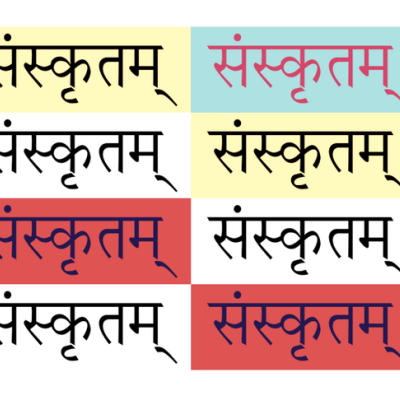About Sanskrit at Yale
One of the classical languages of South Asia, Sanskrit is the major language in which the sacred texts of Hinduism have been written, as well as some of Buddhism and Jainism, and the lingua franca of premodern South Asia for disciplines such as linguistics, medicine, philosophy, ritual, etc. Through four millennia, it has had incredible literary productivity: knowing Sanskrit is the key to understanding premodern South Asia.
Yale is the first university in the US to have introduced the study of Sanskrit, in the middle of the nineteenth century, and historically it has been a major place of Sanskrit education and scholarship. At present, Sanskrit continues to be taught at all levels, from Introductory to Advanced, across genres and disciplines.
Sanskrit Faculty
Sanskrit Resources
Introductory Primers
At Yale, in our introductory course we use Madhav Deshpande’s Saṁskṛta-Subodhini: A Sanskrit Primer. A useful website to accompany the primer is Guy Leavitt’s Introductory Sanskrit, which contains video lessons, flashcards, and exercises.
Another good primer is Devavāṇīpraveśikā: An Introduction to the Sanskrit Language by Robert Goldman and Sally Sutherland Goldman. A very useful website organized around this primer is hosted by the Department of Asian Studies at the University of British Columbia.
A new and excellent primer that students may also wish to consult is The Cambridge Introduction to Sanskrit by Antonia Ruppel. The website has a wealth of resources accompanying the textbook.
Still very useful, particularly for Sanskrit Syntax, is Michael Coulson’s primer, which has been printed many times under several names, one of which is Complete Sanskrit: A Teach Yourself Guide.
Intermediate Readers
The only commonly used Intermediate Sanskrit reader is that of Charles Rockwell Lanman. We use it at the end of the Introductory Sanskrit course and in the fall semester of Intermediate Sanskrit. It is in the public domain and can be downloaded here.
A Vedic Reader for Students by Arthur Anthony Macdonell is focused on the Rigveda. It is in the public domain and can the downloaded here.
Very useful for students interested in the language of the Upaniṣads is An Early Upaniṣadic Reader by Hans Henrich Hock.
Dictionaries
Several dictionaries are useful for Sanskrit students and scholars:
A Practical Sanskrit Dictionary by Arthur Anthony Macdonell. It can be accessed online with an easy search interface at the Digital Dictionaries of South Asia hosted by the University of Chicago. This is particularly useful for looking up the most common meaning of Sanskrit words, as it generally excludes the vocabularies of Vedic literature and all specialized disciplines such as medicine, ritual, etc. It is in the public domain and can be downloaded here.
The Practical Sanskrit English Dictionary by V.S. Apte. It too can be accessed at the Digital Dictionaries of South Asia. Unlike Macdonell, it is a complete dictionary, and students should note that it is organized by most common meaning listed first. It is in the public domain and can be downloaded here.
A Sanskrit-English Dictionary by Monier Monier-Williams. Like Apte, it is a complete dictionary, but students should note that it is organized historically, by earliest meaning listed first. It is available for online search at Cologne Digital Dictionaries hosted by the University of Cologne. It is in the public domain and can be downloaded here.
We should also mention Franklin Edgerton’s Buddhist Hybrid Sanskrit Dictionary produced at Yale. It is available for online search at Cologne Digital Dictionaries.
The University of Cologne website has a most useful interface for search of a great number of Sanskrit dictionaries, including the above-listed four, in several European languages as well as in Sanskrit. The users should be familiar with the search transliteration conventions, the two most common of which are the Harvard-Kyoto system and the ITRANS system.
Grammars
The most useful Sanskrit grammar for students of the language is that of Arthur Anthony Macdonell. It is in the public domain and can be downloaded here.
Macdonell has a parallel volume that introduces the Vedic grammar. It is in the public domain and can be downloaded here.
The standard reference grammar that covers not only Classical Sanskrit, but the Vedic language as well, is that of William Dwight Whitney. It is in the public domain and can be downloaded here. Accompanying Whitney’s Grammar is The Roots, Verb-forms, and Primary Derivatives of the Sanskrit Language.
A Higher Sanskrit Grammar of M.R. Kale is very useful for learning the native Sanskrit grammatical terminology.
Macdonell’s Vedic Grammar is a comprehensive presentation of the grammar of the Vedic language. It is in the public domain and can be downloaded here.
Edgerton’s aforementioned Dictionary is accompanied by the Buddhist Hybrid Sanskrit Grammar.
Manuals
The best available tool for commentarial and philosophical Sanskrit is Scholastic Sanskrit: A Handbook for Students of Gary Tubb and Emery Boose. We use it in our Advanced Sanskrit courses.
A very useful overview of Sanskrit Grammar and reference tables for almost any element of the language is Sanskrit Manual: A Quick Reference Guide to the Phonology and Grammar of Classical Sanskrit of Roderick Bucknell.
The standard work on Sanskrit Syntax is J.S. Speijer’s Sanskrit Syntax. It is in the public domain and can be downloaded here.
For students, also useful is Apte’s Student’s Guide to Sanskrit Composition. It is in the public domain and can be downloaded here.
Typing Sanskrit
The easiest way to type Devanagari is by using the Devanāgarī-QWERTY keyboard layout, which is available for download on the UBC Sanskrit website. It is available both for Windows and Mac users.
To type transliterated Sanskrit with diacritics, MAC OSX users can refer to the excellent guide provided by YogicStudies.com. Windows users can use several utilities, such as keyswap.
Online Resources
Advanced students of Sanskrit have many Sanskrit text depositories available for online search. Interested students should write to the instructor (aleksandar.uskokov@yale.edu).

